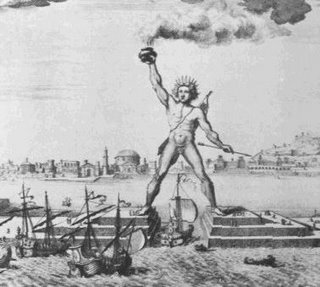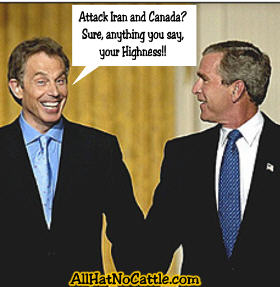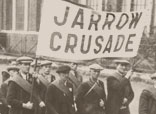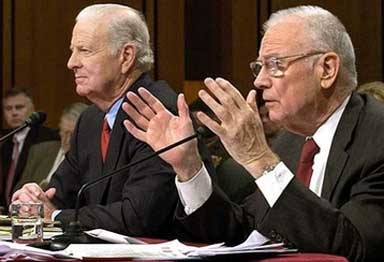Sunday, December 31, 2006
Executing Saddam was the best thing to do
 Should Saddam have been hanged? Blair and Bush have been kicked in just about every part of their record on Iraq, but on this one item I think the correct decision was to let the sentence stand. I'm not just arguing on the basis of Jason Burke's article in The Observer which seems to be inspired by revenge as I always thought the main thrust of those opposed to such a penalty is the very reason that revenge is neither justifiable or civilised. My reasons are essentially political and pragmatic:
Should Saddam have been hanged? Blair and Bush have been kicked in just about every part of their record on Iraq, but on this one item I think the correct decision was to let the sentence stand. I'm not just arguing on the basis of Jason Burke's article in The Observer which seems to be inspired by revenge as I always thought the main thrust of those opposed to such a penalty is the very reason that revenge is neither justifiable or civilised. My reasons are essentially political and pragmatic:1. At enormous cost in life and resources an elected government has been installed in Iraq. The majority of this government wanted Saddam dead and it would have been self defeating to deny their creation its first major judicial decision.
2. If it was not allowed to apply its own version of justice what chance would it have of imposing genuine law and order?
3. Increased internecine fighting is unlikely to occur as the supporters of the former dictator comprise only a minority of the those fighting.
4. It sends out a message to other dictators that the comfortable old age which previous Middle Eastern leaders of this type have enjoyed hitherto, can no longer be guaranteed.
5. Given the mood of the majority Shia population of Iraq, it would have been more dangerous, in terms of levels of violence, not to execute him than to do so.
I've always thought that politics is a matter of choosing the least bad course of action. Sometimes doing that - as in this case - involves the breaching of otherwise vital principles. Allowing Iraq to hang Saddam, without complaint, was the least bad option available to the occupying US-UK forces and it was therefore the correct course to take. It's already a huge mess: no reason to make it even worse.
Friday, December 29, 2006
Cricket Crisis Requires Strong Action

 I've kept quiet about the Ashes to date-see Vaughany there, kissing them goodbye- but a journo mate of mine has concocted a 'National Emergency 10 point Plan' of the kind Oswald Mosley might have produced had be been living now; it amused me enough to reproduce it below:
I've kept quiet about the Ashes to date-see Vaughany there, kissing them goodbye- but a journo mate of mine has concocted a 'National Emergency 10 point Plan' of the kind Oswald Mosley might have produced had be been living now; it amused me enough to reproduce it below:These are dark days.
Here is what must be done, as first steps, to secure this nation's future:
1. The foreign Womble-lookalike Fletcher must be arrested and executed.
2. Osama bin Laden's henchman Mahmood, who leaked the battleplans to Al Jazeera, must be interned at Guantanamo.
3. The nancy boy Harmison must be publicly and ritually dee-bagged, ideally at a full MCG. Boot polish must then be applied to his privates.
4. The man Vaughan who helped destroy the team with his whining about his knees must be tarred and feathered, then horsewhipped.
5. The man Flintoff must be sacked as captain and placed under house arrest pending an MI 6 investigation into his decision to bat. My long term choice as replacement would be Dalrymple, who may not be that great a player yet, but who reminds me of Brearley in that he appears to have a functioning brain.
6. The one known as Montgomery Panesar must be stripped of his Beard of the Year title and forced to shave. He must also GET A BLOODY HAIRCUT.
7. The evil S.K.Warne must be fed a Polonium-20 Pizza.
8. Before the next tour the entire team must be sent on a Marines training course. Those girly boys who fail; wet themselves, or just burst into tears must be gelded on the spot.
9. The Barmy Army must be issued with proper uniforms, including breeches, jackboots and proper leather straps. There must also be an immediate purge of suspect elements within the ranks.
10. All members of future touring parties must be forced to sign an oath of allegiance to Her Majesty The Queen, who, until the Ashes are returned, will be offered safe accommodation at National Emergency Committee Headquarters.
The Leader.
NEC HQ, Day 1 of The New British Calendar(formerly known as 28/12/06).
Thursday, December 28, 2006
Common Sense on Possible End of Union with Scotland
 Yes, the picture shows the Articles of Union between England Wales and Scotland, from 1707. I'm moved to write about them following the good Guardianpiece by David Clark yesterday. His article brought some much needed realism and critical scrutiny to the idea that a Scotland independent of England would be to the advantage of both. He points out that any fracture of the union- as eagerly anticipated by the SNP in the wake of recent polls- is unlikely to bring benefit either side of the border. Much is made of the 'Celtic Tiger' comparison but Clark points out that Ireland, at 34% of GDP, has the second lowest level of public spending in the OECD, compared with Scotland's near 50%:
Yes, the picture shows the Articles of Union between England Wales and Scotland, from 1707. I'm moved to write about them following the good Guardianpiece by David Clark yesterday. His article brought some much needed realism and critical scrutiny to the idea that a Scotland independent of England would be to the advantage of both. He points out that any fracture of the union- as eagerly anticipated by the SNP in the wake of recent polls- is unlikely to bring benefit either side of the border. Much is made of the 'Celtic Tiger' comparison but Clark points out that Ireland, at 34% of GDP, has the second lowest level of public spending in the OECD, compared with Scotland's near 50%: 'No amount of oil money could bridge that gap. For Scotland to emulate Ireland's model would require an assault on public services far more brutal than anything inflicted by Margaret Thatcher.'
Clark goes on to suggest that potential investors would flee as soon as 'the reality of independence dawned'. Moreover, England is likely to remain Scotland's major export market by a mile whatever happens, and it would be foolish to impede this with additional barriers and regulatory frameworks. Furthermore, Scotland's voice would be 'diminished on the international stage'; outside the UK, Scotland's voice would be greatly marginalised.
Meanwhile, those south of the border who cheer on the SNP project merely mimic the Scots in their 'capacity for self pity'. Those English people who complain of the 'Scottish Raj' should appreciate that it's 'Middle England that calls the shots politically' and that Scotland's lower health levels justifies its higher share of UK public expenditure. England would lose out economically if an independent Scotland denied it energy and from the defence point of view if it lost its base for the Trident fleet. Finally, If Scotland left, would Wales, or even Northern Ireland be far behind?
Clark assets that an England shorn of its Celtic periphery would not carry so much clout in the EU or worldwide. I'm inclined to agree with his conclusion that:
There is almost nothing that Scotland can do separately that they cannot do better together as part of the UK. The case for the Union is strong.
Tuesday, December 26, 2006
Blair or Cameron as Politician of the Year?
 Andrew Rawnsley is an interesting columnist who seldom fails to stimulate discussion as is further evidenced by his piece on Blair last Sunday. In it he rehearsed all the manifold failures of this year-sacking Clarke, John Prescott's travails, Lord Levy's arrest and his own police questioning, not to mention the quagmires of Iraq and Afghanistan and the attempts from within his own party to unseat him last autumn. Then he goes on to suggest that Blair has actually had a 'brilliant year':
Andrew Rawnsley is an interesting columnist who seldom fails to stimulate discussion as is further evidenced by his piece on Blair last Sunday. In it he rehearsed all the manifold failures of this year-sacking Clarke, John Prescott's travails, Lord Levy's arrest and his own police questioning, not to mention the quagmires of Iraq and Afghanistan and the attempts from within his own party to unseat him last autumn. Then he goes on to suggest that Blair has actually had a 'brilliant year': 'because of this simple, undeniable big fact. He is still there. There he still is in Downing St... despite it all the great survivor is still there.
I can see where the argument comes from but am not sure I travel so far with it. Yes, he's still there but what's he doing? Not very much. He's just hanging on. His attempt to kick start a Middle East peace initiative seems to have been rebuffed as everyone predicted and the police have been knocking at his door. I'm not sure that succeeding in clinging on to the door frame when others try to kick you out really amounts to being all that 'brilliant'.
More persuasive I would have thought is the case for David Cameron as 'politician of the year' as annointed by no less august a body than the Political Studies Association. Their citation includes the following:
'2006 has seen the Conservatives moving ahead of Labour, with Cameron being rated a better candidate for prime minister than Tony Blair in a YouGov poll in June. After years of being on the back foot, it seems that Cameron's leadership has given the Conservatives a serious chance to revive their fortunes.
No, Blair has done well to hang on-I'd give him the Political Resilience Man of the Year Award- but he has merely marked time while serving out the fag-end of his years in power. Even his obsession- his legacy- concerns the past(when he has been undeniably 'brilliant' in many ways), while Cameron has the better case to argue that he is looking to the nation's future.
Saturday, December 23, 2006
Religion in Deep Decline but Ideal of Christian Behaviour still highly Relevant
 As so often I find I agree with Timothy Garton Ash, this time on the not untopical subject of religion. He argues in favour of the 'intellectually significant minority of Europeans who are, so to speak, devout aetheists... believers in the truths uncovered by science.' Today's survey in the The Guardian, suggests the numbers involved might be more than a 'minority' with 63% claiming not to be 'religious' though with 64% claiming to be 'Christian'. At the moment we experience a religious festival from which virtually all such significance has been squeezed by the assault of market driven materialism.
As so often I find I agree with Timothy Garton Ash, this time on the not untopical subject of religion. He argues in favour of the 'intellectually significant minority of Europeans who are, so to speak, devout aetheists... believers in the truths uncovered by science.' Today's survey in the The Guardian, suggests the numbers involved might be more than a 'minority' with 63% claiming not to be 'religious' though with 64% claiming to be 'Christian'. At the moment we experience a religious festival from which virtually all such significance has been squeezed by the assault of market driven materialism. I would tend to identify with those latter groups. Fairly typically, I was confirmed into the Church of England as a 13 year old and sang as a true believer in my village's church choir. But as my education progressed I grew to doubt a system of belief based solely upon faith rather than evidence. My attendances at church slowly declined until it was only weddings, christenings and funerals which drew me in. I became almost completely secularized and more or less remain so though I would prefer to see myself as 'agnostic' rather than a dogmatic atheist.
Interestingly, 49% of those from 'non Christian' backgrounds see themselves as religious. So we seem to be a largely secular nation with a residual one third still clinging to their faiths but within that a vigorous minority of Jews, Muslims and others to whom religion is possibly more important. And while 57% think religion is a 'force for good' 82% think it 'causes division between people'. I'm not sure which side towards which I tend on that question(though suspect it's the latter) but on another I also agree with Garton Ash when he writes:
I can't get anywhere with Christ as God, but as a human being Jesus Christ seems to me a constant and wonderful inspiration - perhaps even, as (Jacob) Burckhardt put it, "the most beautiful figure in world history".
That just about sums up the position of a group which must extend way, way beyond myself. Christianity, with all those miracles and the extended flummeries of the church, is not credible intellectually but the example of Christ as a person provides a model to which it still seems well worthwhile to aspire. Amen to that at least.
P. S. For a wonderful 90 second visual summary of the world history of religion see this(Hat-tip Roy at Mantex).
Friday, December 22, 2006
Blair no Colossus but Labour still Well Placed
 Political philosopher David Marquand today ridicules Anthony Seldon's characterization of Blair as a 'political colossus' in Wednesday's Guardian.
Political philosopher David Marquand today ridicules Anthony Seldon's characterization of Blair as a 'political colossus' in Wednesday's Guardian.'Blair will leave Downing St with the Labour Party in ruins, a vast swathe of progressive opinion in near despair, public servants demoralized, minority communities disaffected, sleaze rampant, and civil liberties in greater danger than since the repressive legislation of the late nineteenth century.
Yes, not quite a colossus from that point of view but in the same paper Polly Toynbee points to a conundrum: if Blair has been so useless why isn't Cameron more popular than he is and Labour less popular than it is? After a year as leader Blair's ratings were 30% compared to Dave's surely under-performing -5% And, while Conservatives have edged ahead surprisingly on health, they lead otherwise only on tax, crime and asylum. Toynbee is astonished at the size of this 'indignation deficit' after the serial disasters of the third term and concludes:
'... as this bad year ends, Labour still has remarkably solid foundations to build on.
Thursday, December 21, 2006
Iran Wrong Target for Blair?


When I compiled my top ten political columnists a few months back I did not include Anatole Kaletsky(pictured left) in my list. Today's article in The Times suggests I was wrong. His subtle analysis is convincing that Blair-Bush are totally wrong in their Middle East emphases and that Gordon Brown had better think about distancing himself from their position. He argues that the speech given by Blair in Dubai yesterday, attacking Iran, was well wide of the proper mark.
He points out that Iran's recent local elections produced a kick on the shins for the Iranian president where moderate opinion is appearing to be shifting against the extremism of Ahmadinjehad. It may elect a theocracy but Iran's democratic base is far more secure than anything struggling to function in Iraq right now. Far better therefore to target Iranian moderate opinion than alienate it with attacks. He also criticises Blair's decision to concede the SFO investigation in the interests of sustaining relations with Saudi Arabia. We understand from quoted insiders that the decision to drop the case was because the princes threatened to withhold intelligence about terrorist activity. Kaletsky makes two points in this connection:
a) That they are prepared to use such information as lever to preclude the embarrassment the exposure of their leaders' addiction to sweeteners might cause reveals how shallow is their commitment to the War on Terror.
b) Saudi Arabia is more of a threat to the west than Iran in that:
'the radicalisation of previously quiescent Muslim populations from Indonesia and Turkey to Britain, Spain and France continues to be directly funded by the Saudi money pouring into Sunni mosques and madrassas inspired by the extremist Wahhabi sect.
Evidence of Blair's misjudgement was provided by the vice president of Iraq's comment that Blair had been 'brainwashed and black-mailed' by Bush. Given the shift Blair has made from his recent endorsement of negotiating with Ira following his visit to see Bush, there may be a hint of truth in such an explanation but Kaletsky suggests he is more persuaded by the idea that it is Saudi Arabia and Israel who are nudging Bush-Blair in this direction to set up a possible Israeli strike on Iran in the New Year. If this is true than Gordon indeed needs to distance himself from Blair's turbulent foreign policy, to prepare a U turn and pretty sharpish too.
Wednesday, December 20, 2006
Brilliant Biographer Analyses Blair's Career

 Not content with writing a brilliant, 800 page biography of Blair, my old colleague and co-author, Anthony Seldon(pictured) is close to producing another: Blair Unbound. These books are truly monumental, based on hundreds of key interviews; he gives all the royalties of these huge sales, incidentally, to charity. In addition to these Stakhanovite efforts, he has written a fascinating article in The Guardiantoday. Seldon reckons, surprisingly, that Blair's legacy is stronger now than in 2004 when his first book was published and that his 'search for a legacy is showing some signs of progress'.
Not content with writing a brilliant, 800 page biography of Blair, my old colleague and co-author, Anthony Seldon(pictured) is close to producing another: Blair Unbound. These books are truly monumental, based on hundreds of key interviews; he gives all the royalties of these huge sales, incidentally, to charity. In addition to these Stakhanovite efforts, he has written a fascinating article in The Guardiantoday. Seldon reckons, surprisingly, that Blair's legacy is stronger now than in 2004 when his first book was published and that his 'search for a legacy is showing some signs of progress'.Blair's 'choice and diversity' agenda would have been more advanced if he had not taken so long in alighting upon it says Seldon, with the Academies shaping up to qualify 'among his greatest achievements' along with Northen Ireland. He was consequently incensed by the time taken from him by the autumn's attempted 'Brown coup'. Seldon has to admit that on foreign policy since 2003 the cupboard is virtually bare. His relationship with Bush is much ridiculed, but Seldon tells us:
'insiders insist that only with the release of documents, particularly the extraordinary videotaped conferences that take place weekly will the true nature of the relationship be understood. These documents...will reveal an intimate relationship with Bush relying heavily on Blair's evaluation of European and indeed world leaders and Blair emerging as a core player in the internal politics of the administration.
That would be a surprise I have to admit. Seldon may have been fed a line here by Blair's people from whom he must have gleaned all this material, but he is no naive postgraduate student so we must take this seriously. As for the rest we learn Brown-Blair relations are calm at present and that Blair 'is more religious' and 'philosophical...that much of what he sought to achieve will remain unfulfilled by the time he leaves office. Seldon suggests departure date will come 'soon after March 7 next year when he hopes fresh elections for the Northern Ireland assembly could lead to a breakthrough in the province'. He concludes that 'Blair may yet leave on a high point and (almost) at the moment of his own choosing'. So he didn't want to stay on longer than 2007? Now come on Anthony...
Monday, December 18, 2006
New Calls for Blair to go Should be Resisted
 After the blood letting of the autumn I thought it would have quietened those calling for Blair to go right now and not wait for the decent interval which seemed to have been agreed. But the loans for peerages interview with Inspector Knacker of the Yard has brought out a few more such calls out of the woodwork.
After the blood letting of the autumn I thought it would have quietened those calling for Blair to go right now and not wait for the decent interval which seemed to have been agreed. But the loans for peerages interview with Inspector Knacker of the Yard has brought out a few more such calls out of the woodwork.Jackie Ashley is often characterized a member of the Brown camp and maybe, just, this is what prompts her suggestion. She rehearses the infamy of buying or selling seats in the legislature and suggests the resultant vacuum of authority is now so bad that Tony should pack up his bags and, in effect, help Gordon move into Number 10 at once. She may be right, and expect more such clarion calls, but I don't think that in any way it will happen. Nor should it.
All this about Blair was rolled out and inspected in damaging detail last September. The interview was damaging, of course, but he has not been charged and the offence is one of which all PMs have been guilty since Robert Walpole. He is also engaged in an unseemly frenetic and unproductive last minute dash around the world to scare up a legacy of which he can be proud. That is to be expected too, given his passion of 'making a difference' so let him get on with it and stand down as it seems was agreed, in late spring- early summer.
Sunday, December 17, 2006
'The Haves and the Have Yachts' are not good for the Health of Society

 An article in The Observer today [sorry, still can't establish links] deals with a subject I addressed a few months ago: the super rich. We learn that since 2000 the wealth of Britain's richest 1000 individuals has increased to £250 billion; city bonuses regularly top £1 million and often several million more; 'personal worth of £500 and above is common'. The 'new rich' have no sense of vulgarity and spend to impress. So we read of £30K being spent to build an exlusive cat pen for two Bengali cats or a businessman hiring a Premiership footballer to play a game with his son.
An article in The Observer today [sorry, still can't establish links] deals with a subject I addressed a few months ago: the super rich. We learn that since 2000 the wealth of Britain's richest 1000 individuals has increased to £250 billion; city bonuses regularly top £1 million and often several million more; 'personal worth of £500 and above is common'. The 'new rich' have no sense of vulgarity and spend to impress. So we read of £30K being spent to build an exlusive cat pen for two Bengali cats or a businessman hiring a Premiership footballer to play a game with his son. The big difference at this end of the wealth spectrum is that between the rich and the super rich, or as one wag put it: 'the haves and the have yachts'. Amelia Hill talks of the 'Marie Antoinette' syndrome, a world of riches reminiscent of the French court just before the revolution. An ominous comparison? Maybe. It's true that the gap between rich and poor has never been greater. The argument in favour of huge salaries is that they are set by the market to put the best people in the top jobs and that these good people will emigrate to America if they are denied their true worth. I doubt this. Also redistributing wealth to the poor would only provide a sop for those at the bottom. Possibly, but it would be a start.
My fear is that such huge differentials are fuelling negative attitudes in our society in which the very rich symbolize a society which cares little or nothing about the poor who will gestate a mounting socially divisive anger. When the minimum wage is not enough to keep a working man and his family, these huge remunerations are, in my view, not without their dangerous resonances. Maybe it has to do with the politics of envy, but is has also to do with social justice. I'm sure I'm not the only person who feels things are running out of control and that some malign consequence is in store for us in consequence.
Saturday, December 16, 2006
Conspiracy Theorists Defy Stevens
 I swear I'll never use another picture of Lady Di on my blog-which is more than editors of the Express papers can say about their dreadful publications. But the recent Stevens Report provided an instructive insight into the minds of conspiracy theorists. Stevens, using the throroughness of a career senior copper, concluded that all the other stories were rubbish, especially the one about MI6 being behind it. She was not pregnant and not intending to marry Dodi Fayed. The crash occurred as a result of Henri Paul, the driver, being drunk and driving far too fast. This in no way exonerated the jackal hordes of paparazzi who probably caused Paul to drive so recklessly in the first place and, once the crash had occurred, rejected the idea of helping the stricken princess in favour of taking pictures of her.
I swear I'll never use another picture of Lady Di on my blog-which is more than editors of the Express papers can say about their dreadful publications. But the recent Stevens Report provided an instructive insight into the minds of conspiracy theorists. Stevens, using the throroughness of a career senior copper, concluded that all the other stories were rubbish, especially the one about MI6 being behind it. She was not pregnant and not intending to marry Dodi Fayed. The crash occurred as a result of Henri Paul, the driver, being drunk and driving far too fast. This in no way exonerated the jackal hordes of paparazzi who probably caused Paul to drive so recklessly in the first place and, once the crash had occurred, rejected the idea of helping the stricken princess in favour of taking pictures of her. But all this was too simple for the theorists who prefer to hug close alternative ideas. As Simon Hoggart notes in his piece today [sorry, my PC refuses to make links at the moment] such people need a big and complex corpus of facts so that they can cherry pick those which suit their own agenda. Stevens might have exploded a few myths but many more remain. Was Dodi about to propose that night? Who was the mystery (non Camilla) woman Charles was allegedly planning to marry?
The fount of many of these theories, Mohammed al Fayed, was wholly unconvinced by the report which he dismissed in the same terms used to dismiss his own ideas('I feel sorry for the taxpayers and the money that has been wasted on such garbage'). On Today yesterday he insisted it was MI6 which had plotted the murder and that Stevens had been 'got at' by the security services. However hard James Naughtie tried to intrude reality into his interview with the owner of Harrods, it was resolutely thrust aside. But at least he has an excuse- the grief of losing a son, I imagine, is enough to drive you slightly demented and this, ultimately is the kindest thing one can say about the man. The Express newspapers have no such excuse.
Friday, December 15, 2006
Politics Wins Over Principle, Yet Again
 The Guardian excells itself today with the moral contumely it heaps on Tony Blair: 'yesterday was a shabby, shaming day'. First he was questioned in connection with the loans for peerages issue. Second he supported the Attorney General's 'surrender' to Saudia demands that the SFO drop its investigation into the BAE Al Yamamah mega-arms deal for fear that deals in the pipeline might be cancelled; the Saudi princes are alarmed it seems, that their practice of skimming commissions off big deals might be discontinued. There can be no doubt that both issues reflect no credit on Blair's administration and that both smack of a seedy disregard for the law.
The Guardian excells itself today with the moral contumely it heaps on Tony Blair: 'yesterday was a shabby, shaming day'. First he was questioned in connection with the loans for peerages issue. Second he supported the Attorney General's 'surrender' to Saudia demands that the SFO drop its investigation into the BAE Al Yamamah mega-arms deal for fear that deals in the pipeline might be cancelled; the Saudi princes are alarmed it seems, that their practice of skimming commissions off big deals might be discontinued. There can be no doubt that both issues reflect no credit on Blair's administration and that both smack of a seedy disregard for the law.However, maybe I'm losing my Guardian informed moral compass, but I cannot really work up too much indignation over either issue myself. Firstly prime ministerial sale of peerages-either for cash or favours- has been a tradition for centuries and it seems a little quixotic to mount a court case at this late stage in the day; Blair haters of course, are salivating at the prospect of him having his collar felt though the fact he was interviewed as a witness rather than a suspect suggests he will not personally face charges. Of more importance, it seems to me, is the dire state of party finances which threaten the very existence of our democracy.
Secondly, on the arms deal, I can't feel too much anger rising either. Such deals have always involved kick backs and all big companies allow for them when budgeting for sales efforts in the Middle east and elsewhere where such cultures obtain. It has, however, certainly proved an expensive waste of time for the SFO and is a humiliation for that office. But my rather cynical take is that politics often involves taking the course of expediency rather than strict principle and that this is a classic example, where, whatever Goldsmith might claim to the contrary, apart from the diplomatic angles pressures from business and constituencies employing the thousands making the arms, over-rode the importance of the law violation concerned. Again, I feel that a much more important moral concern is the malign effects of the worldwide arms trade itself.
Wednesday, December 13, 2006
Political Party Funding in Crisis
 Funding political parties-already deeply in debt- seems likely to reach an even more acute crisis in the wake of Sir Hayden Phillips' report, covered today.Parties are in decline with money from member subscriptions paying for only a fraction of the £20 mill or so it costs to run a big party each year. As this affects both parties both have sought to persuade big donors to cough up big donations but this has been perceived by voters as government policy made hostage to the highest bidder. Donations were made transparent by New Labour but both parties circumvented that one by taking loans-which do not have to be declared rather than donations which have to be; hence the loans for peerages scandal.
Funding political parties-already deeply in debt- seems likely to reach an even more acute crisis in the wake of Sir Hayden Phillips' report, covered today.Parties are in decline with money from member subscriptions paying for only a fraction of the £20 mill or so it costs to run a big party each year. As this affects both parties both have sought to persuade big donors to cough up big donations but this has been perceived by voters as government policy made hostage to the highest bidder. Donations were made transparent by New Labour but both parties circumvented that one by taking loans-which do not have to be declared rather than donations which have to be; hence the loans for peerages scandal. Now Sir Hayden suggests a cap of £50,000 for all donations which will please neither the Tories with their rich business backers or Labour, kept afloat from its very beginning by union contributions which now equal several million a year. In addition he suggests that the 3.5 million union members who pay £3 a year levy to the party should be officially registered. Maybe it shouldn't, but everyone in politics knows that a funding system relying on people 'contracting in' will attract less support than a 'contracting out' one from an ongoing arrangement. We just tend to be lazy either way. Labour argues that union contributions are qualitatively different from business donations as they come from sources representing groups of people. I wish I could be more impressed by this argument as it is obvious that businesses also represent groups of employees who have an interest in their collective prosperity just as union members do.
So why not introduce more state aid for parties as is so widely practiced on the continent? There are clear objections to this: Why should taxpayers subsidize those whom they seem not especially to respect? Should not parties be voluntary movements based on common support for shared ideas? Would it not involve the state with choosing who controls it? Won't any system of governemt regulated funding in any case be got round by inventive party treasurers as in USA and European countries?
Stand by for some furiously bad arguments from both parties as they seek to stymy the ideas which would damage them while talking up those which would damage their opponents. Sir Hayden, perhaps bravely, seems to have lots of both for both main parties.
Tuesday, December 12, 2006
Tory Poverty Report Blames 'Undeserving Poor'
 IDS's report on poverty had its launch yesterday, attracting fire today from Polly Toynbee. Predictable enough you might think but her well argued case is that IDS is picking out symptoms and slapping 'cause' labels on them.
IDS's report on poverty had its launch yesterday, attracting fire today from Polly Toynbee. Predictable enough you might think but her well argued case is that IDS is picking out symptoms and slapping 'cause' labels on them.Yesterday he[IDS] blamed Five Pathways to Poverty - family breakdown, educational failure, economic dependence, indebtedness and addiction.
The distinction between the deserving and undeserving poor goes back to Elizabethan times and the Charity Commissioners but has been extraordinarily difficult to exorcise from the minds of those who are inclined towards the Conservative view of the world. There is nothing the comfortably off resent more than being asked to give up a portion of their comfort for the benefit of those who have none. So reasons to refuse, or at minimum grumble darkly, are eagerly sought and what could be more emotionally satisfying than to blame the victims for their own circumstances? Toynbee observes:
That poverty causes separation or that poor mothers throw out fathers who can't earn, or who are themselves addicts or criminals in a blighted world of deprivation doesn't feature much. Instead, a great leap into logical fallacy concludes that lack of a marriage certificate is the prime cause of all the rest.
Solving the problem of poverty is immensely difficult, entangled as it is with value as well as financial intractabilities but for all its huge length, IDS's report seems simplistic. Cameron has embraced the report warmly, grateful, perhaps, because it clothes his vestigial liberal Conservative position on social policy with garments his 'blue rinse bigade' will readily recognise and feel able to cheer to the echo at the next party conference.
Monday, December 11, 2006
PFI Chickens Coming Home to Roost

The lead story in The Guardian today is the deficits being run up by a number of recently built hospitals. A major part of the problem seems to be the extraordinary RAB accounting system enforced by the Treasury but an important additional element is the huge monthly repayments on PFI contracts to which these new hospitals(see Lymington pictured) have been committed.
The Private Finance Initiative was originally conceived in one or other of David Willets' alleged two brains. This Conservative egg-head was trying to involve private companies in investing their capital and expertise in public sector projects like hospitals, schools, roads, prisons and the like. The idea was that facilities would be built privately and then leased back to the state; it was a form of 'hire purchase' which let the public have the facilities now and phase repayments over a period of up to 50 years. Lamont and Clarke at the Treasury were interested but insisted the private sector genuinely shoulder the risk as well as ensuring taxpayers received value for money. Faced with such unreasonable restrictions companies stayed away in droves and in 1997 PFI was almost a dead duck. Not for long.
Incoming Chancellor Brown saw in PFI a magic means of delivering the new facilities Labour had promised without increasing government debt beyond his 'golden rule of 40% of GDP. He set Geoffrey Robinson to relax the rules so that the private sector would not be able to resist the offer. This he expertly did, as David Craig explains in his polemic, Plundering the Public Sector. Soon PFI became the only way some areas of the public sector could acquire new facilities as the 'gold rush' got under way. But there were severe problems attached to the scheme:
1. Borrowing for the private sector was typically double that for the public sector where the government is the gauarantor. This means that Robinson had to twist and adjust accounting arithmetic to make PFI projects display an advantage which they never really had.
2. Once PFI appeared a money-spinner lending rates for PFI came down and the companies involved were able to refinance their schemes at a lower rate. Adjusted rules meant they could keep the lion's share of the very considerable resultant profits.
3. To make the scheme attractive repayments were made so generous that companies were guaranteed huge monthly repayments way into the middle of this century- a tab to be picked up not by current taxpayers but by their children.
4. In theory the private sector was carrying the risk and the taxpayer rewarding them accordingly. However with facilities like hospitals the government cannot allow failure so always remains de facto guarantor.
5. Kelvin Hopkins in a recent article points out that the 40% golden rule was arbitrary: countries like Sweden, Denmark and Germany have retained economic stability with public debt far exceeding 50%. Hopkins calls for a return to the cheaper and more simple public borrowing used in the past.
The Guardian article today focuses on the Queen Elizabeth Hopsital at Woolwich where, as one of the first PFI hospitals the 'terms were particularly onerous, locking the trust into repayments at a fixed rate that now looks excessive'. Brown thought PFI could deliver something for nothing- as always on such deals, the chickens eventually come home to roost. Interestingly a senior Labour spokeswoman in 1996 condemned PFI in the following terms:
When the private sector is designing, building financing and running the hospital and employing doctors and nurses, that is privatization and that is what the Conservative government is all about.'
We now see that Harriet Harman(for it was she) was right then and right now but that 'Conservative government' is now a Labour one.
Saturday, December 09, 2006
Blair-Bush Refuse to Accept Reality Defined by Baker Report
 Martin Jacques wrote a smart piece in yesterday about how Baker-Hamilton ISG Report(see picture) has ended the dominance of the neo-con 'unilateralism' around George Bush.
Martin Jacques wrote a smart piece in yesterday about how Baker-Hamilton ISG Report(see picture) has ended the dominance of the neo-con 'unilateralism' around George Bush. 'Before our eyes, the neo-conservative position is disintegrating. Its foreign policy tenets have been shown to be false.'
He dates the neo-con rise back to a reaction to the 'defeatism' which followed Vietnam for some years until the demise of the USSR allowed the likes of Rumsfeld and Cheney to articulate a theory that USA's sole military superpower status should now be used vigorously to further advance American influence. After the ISG report, Jacques concludes, 'The American era is now over'. He predicts that the US will now have to realise that military power does not go very far, that its 'relative economic power...is in decline' and that progress in the Middle East can now only be sought via cooperation with the likes of Iran and the EU. It could also be that the key alliance between Israel and USA 'will no longer be so pivotal and could be increasingly downgraded.'
He predicts that the US will have to accept that 'an increasingly multipolar world requires an entirely different kind of US foreign policy.' Yes, agreed. But has the penny dropped for Dubya? At his press conference on Thursday he confessed himself 'disappointed by the pace of success', a line which Simon Hoggart compared, hilariously with Emeror Hirohito's admission after Hiroshima that, 'the war has developed not necessarily to Japan's advantage'. The Lone Ranger Bush appears to have rejected the key ISG recommendation that talks be offered to Syria and Iran while his faithful Tonto, Tony Blair, appears to think- along with Donald Rumsfeld - that victory is still possible. Tony has even embarked on another doomed mission to solve the Israel -Palestine dispute, presumably to unlock the key to such a victory. How much longer, and how many more lost lives, before both are forced to realise the game is now up?
Friday, December 08, 2006
Brown Likely to be 'Formidable Leader'?
 An intriguing question from Polly Toynbee today is whether Gordon Brown can cut the mustard as PM. There is no doubting his intellectual brilliance, she says, dominating his subject and the House from the Despatch Box,
An intriguing question from Polly Toynbee today is whether Gordon Brown can cut the mustard as PM. There is no doubting his intellectual brilliance, she says, dominating his subject and the House from the Despatch Box, 'But a great Prime Minister needs political genius. So far we don't know if Brown has it. Within a few months he may prove to be a character too inflexible, too inward and just too serious for the top job.'
On the other hand 'we could possibly have the most formidable leader in many years.' Which is it likely to be? Well I have to confess to being agnostic to highly dubious on this one, for the following reasons:
i) Those hoping for a brand new direction from Brown are likely to be diappointed. His record shows he is probably as much a believer in 'Blairite' New Labourism as the progenitor himself. Creating the US-private sector leaning right of centre approach was a joint project- indeed, the most flagrant example, PFI, was Gordon's personal enthusiasm.
ii) Everything Brown has done during his recent 'charm offensive' with pictures of him and his children and flattering image enhancing articles, seem to have left voters cold. The fact is he lacks the one quality-wit, a gift for lightness of touch, self deprecation, in other words charm- Tony has in juggernaut lorry loads.
iii) Brown's performance earlier this autumn, when he appeared to be choreographing a putsch against his leader did not reveal him a good light.
iv) Further to the last piont, Charles Clarke's extraordinary broadside against Brown's lack of collegiallity and other failings must have been rooted in some sort of reality along with the judgement, attributed to John Hutton, that he would make a 'fucking terrible prime minister'.
v) Finally, and most importantly, Polly doesn't stress sufficiently where we are in the broader political cycle. Once we'd had Tories for a decade the experience was more than beginning to pall. So it is with Labour. Under Tony, Labour has already enjoyed its 'salad days' and voters are already limbering up for someone new. And Gordon is by no means new.
To reverese all these negatives Brown will indeed need to be a political genius and, whilst I sincerely hope I'm wrong, I don't believe he is anywhere near being one.
Thursday, December 07, 2006
Eddington Overlooks the Humble Coach Says Monbiot

 As I've become more environmentally aware I've found George Monbiot's articles unmissable. His most recent is apparently a low key idea but so obvious one wonders why no smart young entrepreneur has set up shop as Monbiot suggests and already made a fortune. He points out that the M25 has 790 miles of lanes.
As I've become more environmentally aware I've found George Monbiot's articles unmissable. His most recent is apparently a low key idea but so obvious one wonders why no smart young entrepreneur has set up shop as Monbiot suggests and already made a fortune. He points out that the M25 has 790 miles of lanes. If these lanes were fully used by cars carrying their average 1.6 passenger load at 60mph, the total carried would be 19000. However, coaches travelling at the same speed, each carrying 30 passengers, would increase capacity of this routeway to 250,000 and at a carbon emission reductions of 88% per person.
He proposes that, following the scheme produced by economist Alan Storkey, city centre coach stations be sold and the money used to establish theie equivalents at motorway junctions. Linked by urban buses, the service could be virtually constant on the M25 given dedicated bus lanes and could be sustained by 200 vehicles. Such a service would revolutionize transport within the UK, making it cheap, reliable and safe.
Monbiot is disappointed that nowhere in its 436 pages does Rod Eddington's much discussed report on transpot does the humble coach gain a mention. I think he's right, don't you?
Wednesday, December 06, 2006
Christmas Decorations and The Sun: Some Thoughts Upon
 Occasionally I check out The Sun to see what absurdities it is purveying at any particlar time on its front page. Today offers us nothing on Iraq, nothing in print on Brown's pre budget statement or global warming or indeed anything recognisable as news at all. Instead we are treated to a blast on the subject of Christmas decorations which some local authorities are banning in case they offend people who are not Christian.
Occasionally I check out The Sun to see what absurdities it is purveying at any particlar time on its front page. Today offers us nothing on Iraq, nothing in print on Brown's pre budget statement or global warming or indeed anything recognisable as news at all. Instead we are treated to a blast on the subject of Christmas decorations which some local authorities are banning in case they offend people who are not Christian. Well, apart from judging this a pitifully unimportant headline story- but we're used to soap stars' private lives or even the plot lines of soaps occupying the banner headlines of our best-selling 'newspaper'- I happen to agree with Murdoch's mouthpiece that such PC restrictions in a Christian country are manifestly ridiculous. But I'm forced to add that I do have a kind of related objection- unrelated to political correctness of any kind- and that is to displays on the exteriors of houses depicting, in glorious technicolour neon lights, such scenes as Santa driving his sled though the snow or huge Christmas trees winking 'Happy Christmas' at passers-by.
I know this is my inner Victor Meldrew speaking and that such displays do little or no harm to anything except my blood pressure, but I just find them so mind-numbingly inane and tasteless, I cannot imagine what the houseowners concerned are seeking to achieve. [Sorry about this- my Meldrew got the upper hand].
Tuesday, December 05, 2006
English in Scotland Cannot Prevent Independence
 The article by Professor TM Devine, of the University of Edinburgh today offers an interesting angle on the possibilty of Scotland(Holyrood pictured) sailing away from 'mainland' England and Wales as the Union proceeds to break itself up. The polls that showed 52% of Scots as favouring independence has almost made this prospect an expected outcome in the medium term future. Devine offers a timely dose of realism to this nationalist euphoria. He points out that both nations have intermingled to an astonishing extent since the Union was effected in 1707. Between 1841 and 1911 a quarter of a million English moved north of the border and at the current figure of 400,000 they are the largest by far immigrant group. By the same token hundreds of thousands of Scots have moved down to join the rest of us, a fair number of them, as has been noticed, the result of being elected to Parliament and going on to occupy seats in the Cabinet.
The article by Professor TM Devine, of the University of Edinburgh today offers an interesting angle on the possibilty of Scotland(Holyrood pictured) sailing away from 'mainland' England and Wales as the Union proceeds to break itself up. The polls that showed 52% of Scots as favouring independence has almost made this prospect an expected outcome in the medium term future. Devine offers a timely dose of realism to this nationalist euphoria. He points out that both nations have intermingled to an astonishing extent since the Union was effected in 1707. Between 1841 and 1911 a quarter of a million English moved north of the border and at the current figure of 400,000 they are the largest by far immigrant group. By the same token hundreds of thousands of Scots have moved down to join the rest of us, a fair number of them, as has been noticed, the result of being elected to Parliament and going on to occupy seats in the Cabinet. Maybe it's the work of the sub-editor but the article seems to argue that all these folk of southern provenance will frustrate the ambitions of the narrow minded nationalists. If this is the thrust of the piece, I'm far from convinced:
i) An SNP First Minister would hold a referendum on independence one presumes. While 400K is a big chunk of 5 million people, it would not necessarily swing the decision either way.
ii) Referendums on devolution to date have entailed simple majorities- apart from the ones in the seventies which specified a 40% of voters requirement. The English contingent would not prevent a simple majority from being returned for independence.
iii) Who is to say people of English descent have not been converted to the idea of independence? I know a few English immigrants to Wales who have got weirdly entusiastic about Plaid Cymru and I'm sure there are more than a few in Scotland for whom English roots are irrelevant.
iv) The poll registered 52%, presumably including immigrants of all kinds.
Professor Devine has not convinced me the danger to the Union is any less than I thought before reading his article.
Monday, December 04, 2006
It's Official: 'Special Relationship' Doesn't Exist
 Caitlin Moran in her Times today, has some fun with the soi disant US-UK 'special relationship'. A pretty senior State Department official, Kendal Myers, has described it as 'totally one sided' and Britain's role as a bridge between the US and Europe as 'disappearing before our eyes.' 'We typically ignore them' he said of our efforts to influence US policy, 'and take no advice- it's a sad business'. He went on to admit to being ' a little ashamed' at the way Bush had treated Blair, given how much our man has invested in standing by the USA after 9-11. 'There was no payback, no sense of reciprocity' he concluded.
Caitlin Moran in her Times today, has some fun with the soi disant US-UK 'special relationship'. A pretty senior State Department official, Kendal Myers, has described it as 'totally one sided' and Britain's role as a bridge between the US and Europe as 'disappearing before our eyes.' 'We typically ignore them' he said of our efforts to influence US policy, 'and take no advice- it's a sad business'. He went on to admit to being ' a little ashamed' at the way Bush had treated Blair, given how much our man has invested in standing by the USA after 9-11. 'There was no payback, no sense of reciprocity' he concluded. So it seems we needed to wait until the State Department itself, told us what we had long known anyway: the 'special relationship', if it ever existed, is no more, it is defunct and Blair's continuing attempt to use US power by proxy to fulfill his messianic visions doomed to failure. The price has been humiliation for poor Tony ('Yo Blair') and the sad neglect of what should be our foreign policy priority, Europe, and the long term goal of making it a genuine centre of power and influence to protect collective interests and work towards the goals of peace and security worldwide.
It might be argued that the 'special relationship' never existed anyway once the last world war ended. The US was quick to put an end to favourable economic concessions and a decade later allowed her historic ally to be humiliated by the Suez debacle. OK, we received belated support during the Falklands War in the shape of intelligence and we may or may not have received privileged CIA intelligence in more recent years... for example, all that stuff about Saddam having WMD...No, I'm very doubtful about anything being 'special'; indeed it could be argued that Britain, has received very little in exchange for its faithful support for the USA through thick and thin and that the real recipient of very special treatment is not the us, UK, but Israel. Moran suggests that as we have been 'dumped' by the USA we should set our cap at another cute looking transatlantic object of desire: Canada.
Saturday, December 02, 2006
The Limits of Spin
 'Spin' is nothing new, of course. The greatest exponents of its black arts were Stalin and Hitler. 'The bigger the lie, the more they will believe it' wrote Hitler in Mein Kampf and Stalin's lies managed to persuade swathes of the cleverest people on the interwar left that he really had invented a 'New Civilisation' as Sidney and Beatrice Webb's book on the USSR was subtitled. Since then spin's practitioners have not been idle but the word did not enter the mainstream on this side of the Atlantic until Peter Mandelson began working his 'New Labour' magic.
'Spin' is nothing new, of course. The greatest exponents of its black arts were Stalin and Hitler. 'The bigger the lie, the more they will believe it' wrote Hitler in Mein Kampf and Stalin's lies managed to persuade swathes of the cleverest people on the interwar left that he really had invented a 'New Civilisation' as Sidney and Beatrice Webb's book on the USSR was subtitled. Since then spin's practitioners have not been idle but the word did not enter the mainstream on this side of the Atlantic until Peter Mandelson began working his 'New Labour' magic. Today in the Guardian we learn that David Cameron has his very own Mandelson, a fellow public schoolboy by the name of Steve Hilton(not sure if my picture is the right one as Google images offered several popsingerish alternatives). The son of a Hungarian ice hockey champion refugee called Hircksac who fled in 1956 and anglicised his name, 'Hilton's' phenomenally bright brain led him via a scholarship to Christ's Hospital School Sussex on to PPE at Oxford. In 2001, despairing of the Tories, he voted Green but was tempted back into the Conservative fold and is now Cameron's closest advisor, partner to fellow aide Rachel Whetstone and faithfully dogging his footsteps on photoshoots around the world. The Rove-esque soubriquet 'David's Brain' has already been coined.
'You can't sell politicians like washing powder' he is quoted a saying, 'It's messages that count.' I'm sure this is right but this doesn't stop spin doctors still trying desperately to succeed at the washing powder thing. My feeling is that the key messages about politicians are communicated, eventually, by themselves. Just as you can't sell WD40 as a washing powder, so you can't sell someone lacking the 'right stuff' as someone who has it. So we had Duncan Smith offered as a strong, family based 'quiet' man who would add integrity and honesty to his other qualities when leading the nation. The problem there was that, after seeing a fair bit of IDS on our TV screens we did not believe in his 'other qualities' at all.
Similarily with Blair: he was offered as the miracle ingredient we had all been waiting for by Mandelson and Campbell who cleverly wrote the scripts for this consumate actor/politician. It's taken a while but most people by now have seen through the spin. We see so much of leading pooliticians that we come to 'know' them in a way we never did before. The public is apathetic about politics but-unless I'm totally naive and the cynics right- most voters are able to judge character reasonably well. Eventually politicians fail to fool most of the people most of the time and are rumbled.
Hence Michael Foot- lovely guy but not PM material; Neil Kinnock- more or less ditto; Michael Howard, capable politician but basically an unlikeable unreconstructed Thatcherite. This is the problem 'Steve' faces: has his man got the necessary qualities? Is he really what he is being presented as? If he is, than the public might well place him in Downing St, but if he is not, then, as some recent polls seemed to suggest, he'll end up merely as a historical footnote. If Hilton really is 'Dave's Brain', my bet is that Dave won't last long.
Friday, December 01, 2006
Suez and Iraq: How History Repeats Itself


My two pictures, one of Professor Elizabeth Wilmhurst and the other of the Suez Canal several decades ago are linked by Richard Norton Taylor's excellent article today. The Guardian hack-who seems to spend his life in the Kew Public Records Office- writes of the fact that Eden was warned by his Attorney General, Reginald Manningham-Buller(father of our present head of MI5) on the subject of his proposed invasion of Suez on the clandestinely arranged pretext of 'separating' Israel from the attack it had made on Egypt. 'Sir Reginald Bullying Manner' as he was nicknamed, wrote an angry letter to his PM on 1st November 1956, protesting that the proposed action was illegal.
Other senior figures in the F.O. took the same view and the AG, along with others, was said to have 'seriously considered' resignation. However Eden insisted to the AG and his deputy Harry Hylton-Foster, according to the Cabinet Secretary, the great Norman Brook, that 'the government's decision was taken on the grounds of policy, not of law.' So that was OK then: 'it's illegal but it's our policy'. Brook advised Eden to instruct his ministers 'to avoid further reference to the question of law'.
The parallel with Iraq is inescapable. On 18th March, 2003 Elizabeth Wilmhurst, Deputy Legal Advisor to the FCO, resigned thus to her superiors:
I cannot in conscience go along with advice - within the Office or to the public or Parliament - which asserts the legitimacy of military action without such a [UN] resolution, particularly since an unlawful use of force on such a scale amounts to the crime of aggression; nor can I agree with such action in circumstances which are so detrimental to the international order and the rule of law. I cannot in conscience go along with advice - within the Office or to the public or Parliament - which asserts the legitimacy of military action without such a resolution, particularly since an unlawful use of force on such a scale amounts to the crime of aggression; nor can I agree with such action in circumstances which are so detrimental to the international order and the rule of law.
Both actions were illegal under international law. Eden was reassured by his biddable Lord Chancellor, Lord Kilmuir, that the attack was indeed legal, just as Blair was assured by his own equally biddable law officer - Attorney General Lord Goldsmith - that the invasion of Iraq was 'strictly legit'(to use a phrase beloved of wrestling commentator, Kent Walton when Big Daddy bit off Masambula's nose). Whenever was this phrase more appropriate: "Plus c'est la meme chose, plus ça change"?



